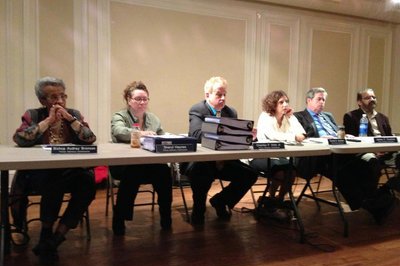Pleas for transparency in the Nizah Morris case were renewed Monday at a Police Advisory Commission meeting at the William Way LGBT Community Center.
Morris was a transgender woman who was found with a fatal head wound in December 2002, shortly after receiving a courtesy ride from Philadelphia police.
The PAC issued an opinion earlier this month that recommends state and federal probes into her homicide, citing an inefficient local investigation.
But efforts to secure the probes may be hindered, as the PAC is withholding numerous Morris investigative records from the public, citing a state law that protects the confidentiality of open homicide cases.
Advocates for Morris say the records should be released to help underscore the need for state and federal probes.
“I think it’s both ironic and tragic that a supposed matter of law that should protect an investigation is indeed inhibiting a more just and thorough investigation,” trans activist Ben Singer told PGN.
After the meeting, PAC member Chuck Volz said the commission’s Morris records would be released if a judge orders the agency to do so.
“I’m all for transparency,” Volz told PGN. “If we get presented with a court order to divulge our Morris records, of course we’ll do it. I don’t see the big deal.”
In May 2008, Common Pleas Judge Jane Cutler Greenspan signed an order requiring all city agencies to release their Morris investigative records to the public.
The PAC has already released numerous Morris records due to the order, but it is unclear if it will release additional records.
Volz recently penned an essay about the Morris case entitled “No More Sinning by Silence,” that will appear in 10,000 Pride Guides.
“Nizah Morris is deserving of the respect and dignity that she didn’t get,” Volz said. “She died after being in police ‘custody.’ Something is wrong.”
About 65 people attended the April 15 meeting, including two relatives of Morris.
Bradly Brown, Morris’ sister and a former police officer, said she’s convinced the police caused Morris’ head injury.
“When I went to the morgue and saw the wound on Nizah’s head, it was a wound I’d seen many times,” Brown told the crowd. “Clearly, she was hit by the butt of a gun.”
Officers Elizabeth Skala, Thomas Berry and Kenneth Novak responded to Morris in the pre-dawn hours of Dec. 22, 2002.
The PAC’s 2007 opinion cleared the officers of any involvement in her death, but the new PAC opinion stops short of doing that.
Transgender activist Leah Basarab expressed the need for more information about the city medics’ response to Morris.
According to an eyewitness at the scene, medics Teresa Height and Steve McCarthy had a lengthy discussion with Berry before Berry placed Morris’ jacket over her face.
When Height and McCarthy transported Morris to Jefferson University Hospital, they didn’t give any information about her to staff, according to hospital records.
The resulting confusion helped paved the way for Novak, Berry and Skala to respond at Jefferson and focus their paperwork on Morris as a “hospital case” rather than as a courtesy-ride recipient and crime victim.
PAC members said their review didn’t encompass the role played by medics.
Phil Cochetti, who’s followed the Morris case for 10 years, applauded PAC for recommending state and federal probes.
“This is not to diminish what happened to Nizah, but the danger is more than [to] an individual person,” Cochetti told PGN. “If evidence in a homicide where police are implicated can be ‘lost,’ then we’re all at risk. What safety and what faith can we have in the police?”
Cochetti called for a follow-up community meeting to raise awareness about the case by organizing petition, email and letter-writing campaigns.
PAC also recommends police cadets undergo more diversity training, but Singer expressed concern about that suggestion.
“In the very section where the PAC used the most insensitive language in the report, saying police did not understand the ‘proper handling of a transgender’ — this was the very section they make a recommendation about sensitivity training,” Singer told PGN. “The fact they are not themselves trained on matters pertaining to transgender-affirming language use speaks to the issue of the PAC needing training. They are right about the training part, but very off-the-mark in terms of how this training should occur and using what training tools. Their proposal will not help trans and gender-nonconforming people, if the police even take up this recommendation, given the PAC itself does not understand how to use language in gender-affirming ways and is citing an outmoded-by-20 years police-training program that only focuses on sexual orientation.”

